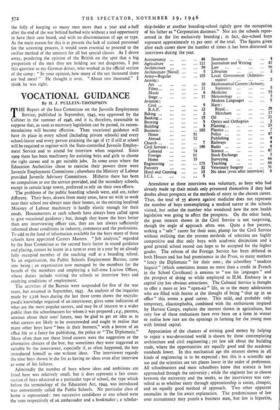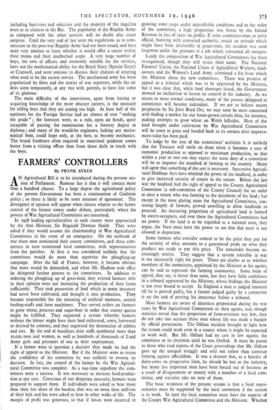VOCATIONAL GUIDANCE
By H. J. PULLEIN-THOMPSON
THE Report of the Ince Committee on the Juvenile Employment Service, published in September, 1945, was approved by the Cabinet in the summer of 1946, and it is, therefore, reasonable to suppose that, as soon as necessary legislation can be passed, its recom- mendations will become effective. Then vocational guidance will have its place in every school (including private schools) and every school-leaver and every person attaining the age of 17 if still at school will be required to register with the State-controlled Juvenile Employ- ment Service and to attend for interview when required. Since 1909 there has been machinery for assisting boys and girls to choose the right career and to get suitable jobs. In some areas where the Education Authorities chose to exercise their powers there were Juvenile Employment Committees ; elsewhere the Ministry of Labour provided Juvenile Advisory Committees. Hitherto there has been no compulsion to use the service provided, and the secondary schools, except in certain large towns, preferred to rely on their own efforts. The problems of the public boarding schools were, and are, rather different. Their boys, drawn from many areas, have no wish to work near their school nor always near their homes, so the existing localised Ministry of Labour machinery is hardly elastic enough for their needs. Housemasters at such schools have always been called upon to give vocational guidance ; but, though they know the boys better than any interviewing officer can, they are not always sufficiently informed about conditions in industry, commerce and the professions. To add to the fund of information available for the boys many of these schools have appointed Careers Masters. " Job analysis," regarded by the Ince Committee as the second basic factor in sound guidance and placing, cannot be learnt in a term or even in a year by an already fully occupied member of the teaching staff at a boarding school. So an organisation, the Public Schools Employment Bureau, came into being ; an organisation now managed by the members for the benefit of the members and employing a full-time Liaison Officer, whose duties include visiting the schools to interview boys and studying conditions of employment.
The activities of the Bureau were suspended for five of the war years, but resumed in September, 1945. An analysis of the inquiries made by 1,226 boys during the last three terms shows the encyclo- paedic knowledge required of an interviewer, gives some indication of what are the most popular careers, and may be of interest to a wider
public than the schoolmasters for whom it was prepared ; e.g., parents, anxious about their sons' future, may be glad to get an idea as to what careers are likely to be overcrowded and ought to realise that many other boys have " bees in their bonnets," with a horror of an office life or a fancy for publishing, the police or " The Diplomatic." More often than not these listed careers were the suggestion or the alternative choices of the boy, but sometimes they were suggested as suitable by the interviewer, especially if, as often happened, the boy introduced himself as one without ideas. The interviewer regards the nine boys shown in the list as having no ideas even after interview as some of his failures.
Admittedly the number of boys whose ideas and ambitions are
listed here was relatively small, but it does represent a fair cross- section of boys educated at a particular type of school, the type which before the terminology of the Education Act, 1944, was introduced was conveniently called the Public Schools. No particular class of home is represented : two successive candidates at one school were the sons respectively of an ambassador and a bookmaker ; a scholar-
ship-holder at another boarding-school rightly gave the occupation of his father as "Corporation dustman." Nor are the schools repre- sented in the list exclusively boarding ; in fact, day-school boys represent approximately 15 per cent. of the total. The figures given after each career show the number of times it has been discussed in interviews during the year.
Accountancy ...
Agriculture ...
Architecture ...
Architecture (Naval) ... Army—Regular
46
111
59 5
105 Insurance... . ... Journalism and Writing
Law ... ... ...
Librarian ... ... :.. Local Government (Adminis-
4 47 96 2 Artistic :
trative)... ... ... 2
10
Mathematical Careers (Actuary,
Films...
11
Statistics) ... ... ...
5
Music
6 Medicine ... ... ... 55
Stage...
11
Meteorology ... ... ... 3 Aviation:
Modern Languages ... ... 5 Civil ... ..•
9
Navy:
R.A.F.
... 12 Royal... ... 25
Baking ...
... 2 Merchant ... 17
Banking...
... 15 Oil ...... ... . 21
Brewing
... 5 Optics and Orthopncs 2
Building
... 3 Planting... ... ... 25
Business:
... 103 Plastics ... 7
Home
51
Police ... 47
Abroad
52
Publishing 4
Church ...
7 Railways 4
Civil Service :
... 190 Radio ... ... 4
Colonial
74
Science ... ... 47
Foreign
81
Stock Exchange
3
Home
35
Surveying ... 66
Engineering ...
... 173 Teaching ... 66
Forestry
... 32 Veterinary Surgery ... ... 31
Hotel and Catering ...
... 13 No ideas (even after interview) 9
Attendance at these interviews was voluntary, so boys who had already made up their minds only presented themselves if they had doubts about prospects or the methods of entry to the chosen career. Thus, the total of 55 shown against medicine does not represent the number of boys contemplating a medical career at the schools visited, but rather the number who wondered how the new health legislation was going to affect the prospects. On the other hand, the great interest shown in the Civil Service is not surprising, though the angle of approach often was. Quite a few parents, seeking a " safe " career for their sons, plump for the Civil Service without realising that the present methods of selection are highly competitive and that only boys with academic distinction and a good general school record can hope to be accepted for the higher grades. The reform of the Foreign Service has been debated in both Houses and has had prominence in the Press, so many mothers " fancy the Diplomatic " for their sons ; the schoolboy "modern linguist" (which sometimes means no more than a credit in French in the School Certificate) is anxious to "use his languages " and the prospect of doing so while employed in H.M. Embassy in a capital city has obvious attractions. The Colonial Service is thought to offer a more or less " open-air " life, so to the many adolescents who are filled with horror at the thought of being " shut up in an office" this seems a good career. This mild, and probably only temporary, claustrophobia, combined with the enthusiasm inspired by Harvest Camps, explains the interest shown in agriculture, but very few of these enthusiasts have ever been on a farm in winter or realise how rare are the openings in farming for the young man with limited capital.
Appreciation of the chances of earning good money by helping to repair a war-devastated world is shown by those contemplating architecture and civil engineering ; yet few ask about the building trade, where the opportunities are equally good and the academic standards lower. In this mechanical age the interest shown in all kinds of engineering is to be expected ; but this is a scientific age too and the scientists are ten places lower in the order of preference. All schoolmasters and most schoolboys know that science is best approached through the university ; while the engineer has to choose between the university and the works, so the interviewer was con- sulted as to whether entry through apprenticeship is easier, cheaper, and an equally good method of approach. Two other apparent anomalies in the list await explanation. The predominance of law over accountancy may puzzle a business man, but law is bipartite, including barristers and solicitors and the majority of the inquiries were as to chances at the Bar. The popularity of the Regular Army as compared with the other services will no doubt also cause surprise. Until the very end of last term the regulations as to com- missions in the post-war Regular Army had not been issued, and boys were very anxious to learn whether it would offer a career within their means and their intellectual scope. A very large number of boys, the sons of officers and eminently suitable for the services, have not the mathematical ability for the Royal Navy (Special Entry) or Cranwell, and were anxious to discuss their chances of entering what used to be the easiest service. The mechanised army has been popularised by films and the stories of war reporters, while the air does seem temporarily, at any rate with parents, to have lost some of its glamour.
The main difficulty of the interviewer, apart from having or acquiring knowledge of the more obscure careers, is the necessity for telling boys that they are aiming too high. At least half of the aspirants for the Foreign Service had no chance of ever " making the grade" ; the foresters were, as a rule, open air fiends, quite incapable of passing the examination for a forestry degree or diploma ; and many of the would-be engineers, lacking any mathe- matical bent, could hope only, at the best, to become mechanics. The brutal frankness often required in vocational guidance comes better from a visiting officer than from those daily in touch with the boys.



































 Previous page
Previous page